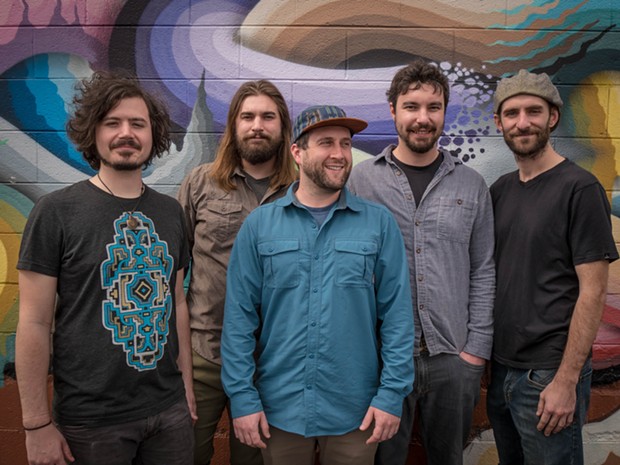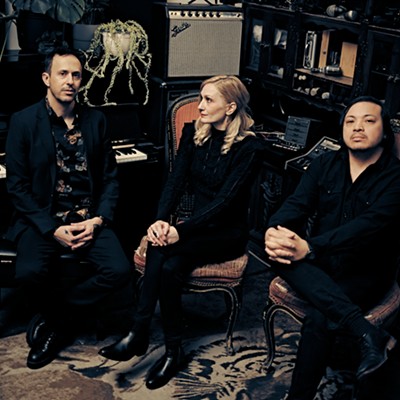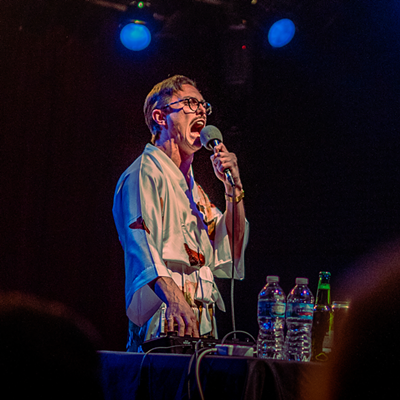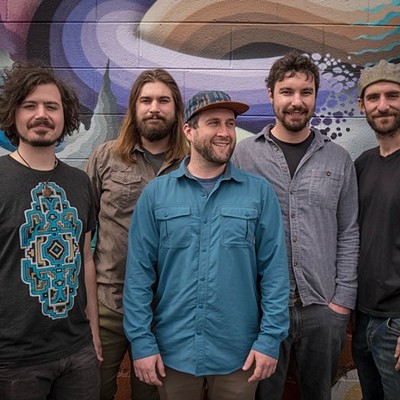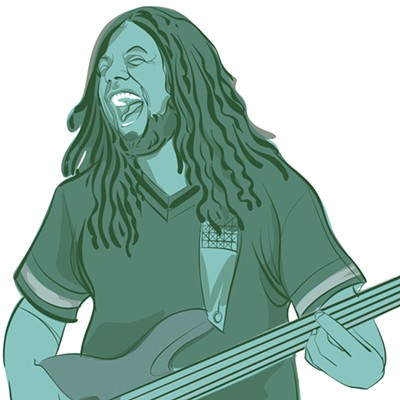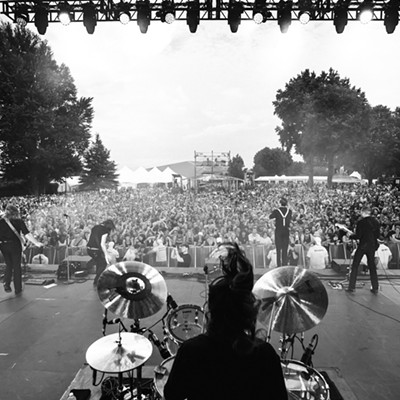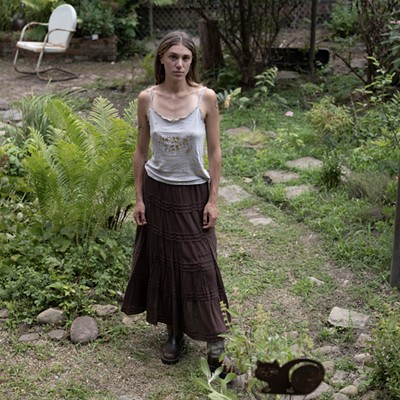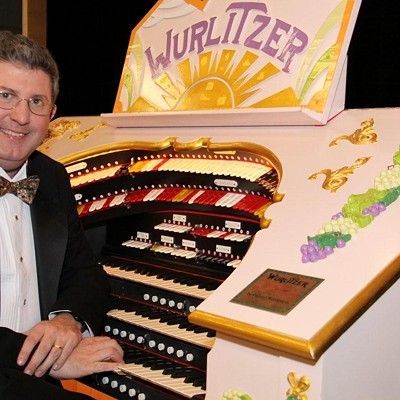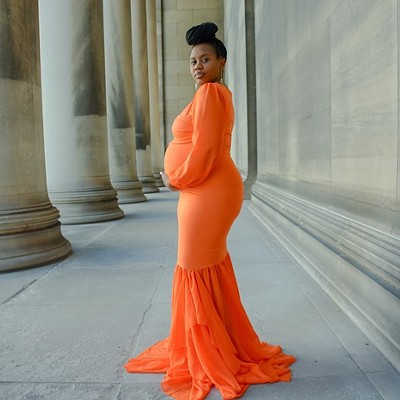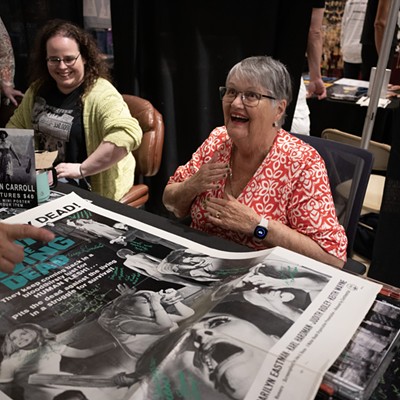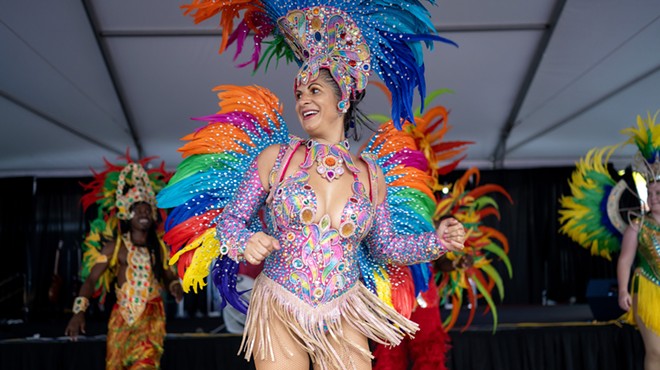The 12-track release is a genre-defying concoction that takes advantage of modern advancements with white noise and synthesizers. It was made via the use of Splice, a program that allowed the members to all collaborate on songs from the comfort of their own homes.
Before the Athens, Ohio-based, five member group — made up of Billy Brouse, Mike Healy, Sam Brouse, Rob McConnell, and Anthony Thogmartin — brings its pulsating, electronic show to The Rex on Saturday, CP chatted with keyboardist Brouse about the new album, touring, and the power of technology.
Will you tell me about the process of making Content Coma?
It can be read two ways: Content Coma, as in a state of peaceful happiness, or Content Coma, as in substance or material. I honestly didn’t realize that until a little way in, and it kind of makes sense. It’s basically about constant simulation and how access to everything you ever need is in your pocket on your phone, all the time. Not saying it’s bad, but recognizing it, being content with all the content. It’s very helpful, but its also changing the world, and it has been, and it’s not going to stop, really.
So, that ties into the music video for “Content Coma.” How was that made? Why that song over others on the album?
We didn’t give the director too many notes. He’s from Germany. We had him listen to the album, and we picked a couple of songs, and he wanted to do that one. I think it really spoke to him. He was like, “I will make the video for you, you will really like it very much, very very much. It will be coming to you very soon.” And we were like, “What? Okay, dude. You don’t want any notes or anything?" He was like, “No.” So, he just went for it and it’s pretty much exactly what the song's about. I know it’s not really that abstract of an idea to grasp, but I think he nailed it, honestly. Like I’m sure we could have changed a couple things but we didn’t ask him to, we thought it was great.
What was your reaction when you first saw the video?
Well, I had seen some test clips, to make sure it was in the vein we wanted. So I knew what it was kind of going to look like but didn’t know it was going to look … it’s pretty trippy. It was a little further out there than I thought. We didn’t talk to him that much besides, “Hey man, we trust you.” It was crazy, I was very pleasantly surprised.
So that song spoke to him, but you guys had 12 songs to choose from when picking a title track. Why did you choose "Content Coma?"
It’s pretty catchy, it gets stuck in your head. At least for me. Like months before we released the album, I kept texting my brother, who wrote most of it, “Dammit Sam, I can’t get this out of my head.” It’s also not super long, it’s a good single, and I think it’s pretty accessible. It also ties in the theme of the record. And honestly, it just kind of became "Content Coma." Like we were all just thinking the same thing at the same time.
Your website says that Papadosio "strives to create music that is strangely familiar." How do you balance your sound without crossing the line into music that’s been heard before?
Even if we try to do music that you’re used to … like, way back in the day, we tried to play a bluegrass song just to see if we could do it. I guess we did it, but it still sounded like us. Like, there’s no way around it. With any song we write, it’s going to sound like us, even if we tried to do a completely different thing. So that’s one thing. We also don’t really have a formula for how the music should be. And we're constantly getting new gear, 'cause why not? So, for me at least when I get a new piece of equipment or get new software, that helps me write and I can’t
What does your process look like when you are creating music?
Everyone’s different, but for the most part, we write everything on computers and sequence all the drums and, not like a
Wow, technology.
Yep, content coma.
I saw you were at Hulaween! I was there, too. Festivals are a big part of your tour circuit. What’s it like performing at a major festival versus your own show?
It’s a whole different experience. It’s not any better or any worse. I mean it’s great when you’re at a huge festival and you get a sound check, like a really good long one earlier that morning, and you know everything’s all dialed in and you’re all ready to go. Like at a club show, it’s a lot more comfortable and everything is how you normally have it. So sometimes at festivals, like for [Hulaween] we had just flown in from Denver like two hours before the set, and we had a lot of stuff for on stage, and we were all pretty tired. So in the cases when that happens, we’re set up right at the show.
Sometimes it’s good, because the energy that we have, it is coming from a whole different place. Like, we’ve been traveling and its like, “Oooughhh,” then you get on stage and it’s like, “Oh yeah, this is great! I’m playing a show with my friends! Everything is fine.” So, that’s kind of what happened at Hulaween. Then club shows are way more relaxed, like I
What’s been your favorite festival to perform at?
Hmmm. We’ve done so many festivals, its crazy. But one of my favorites was the Oregon Country Fair, which is in Eugene, Oregon, so it’s like out in the cut a little bit. And it’s weird, it’s so weird. But my
Why is the Oregon Country Fair weird?
There’s like 10,000 volunteers or something. So during the day, it’s
So you'll be at The Rex performing on Saturday. What can fans expect?
Well, we love Pittsburgh and we haven't been there in a long time, I feel like it's been a minute since we've been to The Rex, and we're really good friends with Ben and the Grey Area Production guys are great, so we look forward to being there. We'll be in high spirits for sure. Probably a little bit lethargic from turkey still, but, it's going to be great. So, just expect our crazy Papadosio show. It's what we do.

